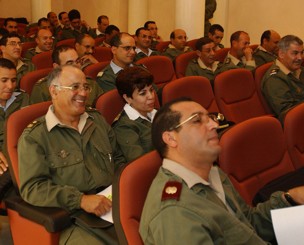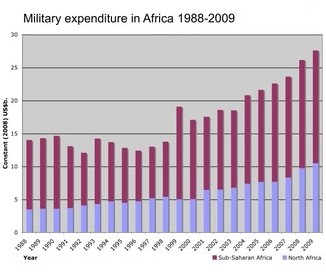|
Algeria | Morocco Economy - Development | Politics Morocco, Algeria arms race accelerating
According to new data from the Stockholm International Peace Research Institute (SIPRI), a think tank that collects data on international arms transfers, total military expenditure in Africa in 2009 was US$ 27.4 billion. Out of this, North Africa spent US$ 10 million in arms last year.
While the Saharawis, since the 1991 ceasefire, are lagging strongly behind in the arms race with the Moroccans, Algeria has managed to renew its already larger and better equipped army. The Moroccan-Algerian arms race indicates that both the Rabat and Algiers governments do not exclude a future armed conflict between the two countries over the Western Sahara issue. afrol News earlier has reported that Morocco in 2009 was to double its defence budget in real terms, reaching 16 percent of total state expenditures. The Moroccan press had calculated Morocco's defence budget for 2009 to reach Dirham 34 billion (US$ 3.5 billion); or three times the 2005 budget. But the boost in Moroccan arms spending is mainly a reaction to Algeria's very high defence spending over decades. Algeria counted for 89 percent of total arms imports to the North African region (excluding Egypt) in the 2005-09 period and thus strongly increased its military upper hand versus Morocco, according to SIPRI. The SIPRI report, which makes reference to afrol News' article, discusses an Algerian-Moroccan "arms race", although concluding that the scientific definition of the term "arms race" would call for data of an arms import competition during "20-30 years". However, Morocco's new military acquisitions in 2008 and 2009 were "lending weight to arms race fears." While the SIPRI analysis expresses concerns over the increased military build-up in the Maghreb, it concludes that "the likelihood of interstate conflict between Algeria and Morocco is low." Still, SIPRI holds that "these reactive acquisitions do not contribute to an improvement in Algerian-Moroccan relations." By staff writer © afrol News - Create an e-mail alert for Algeria news - Create an e-mail alert for Morocco news - Create an e-mail alert for Economy - Development news - Create an e-mail alert for Politics news
On the Afrol News front page now
|
front page
| news
| countries
| archive
| currencies
| news alerts login
| about afrol News
| contact
| advertise
| español
©
afrol News.
Reproducing or buying afrol News' articles.
You can contact us at mail@afrol.com









